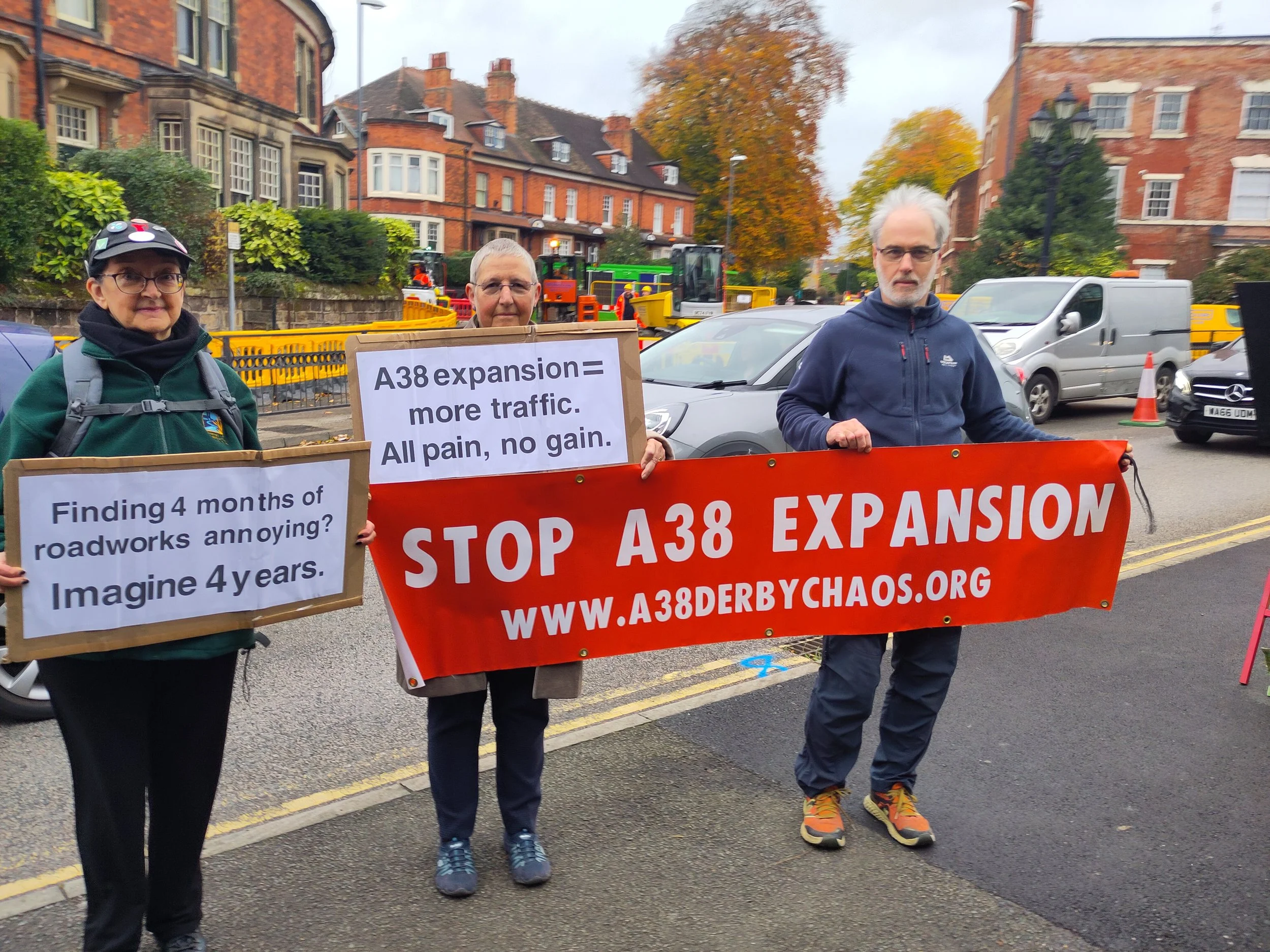Press release: Finding four months of roadworks annoying? Imagine four years, say Stop A38 Expansion campaigners
Three members of the Stop the A38 Expansion campaign who live near the A38 Markeaton junction and Kedleston Road held placards near the current Five Lamps roadworks to highlight what they call “just a taste” of what Derby will face if the A38 expansion goes ahead.
The Five Lamps works have already caused frustration with rat runs, delays and safety concerns. Campaigners stress they don’t oppose these short-term roadworks — but urge people to imagine four years of disruption from construction of flyovers, underpasses and road widening of a dual carriageway. They say the A38 project would bring years of noise, dust and gridlock.
“There’s currently no traffic mitigation plan for how Derby will cope with years of A38 road works,” said Clare Wood, 57, a copywriter from Mickleover “National Highways’ and Derby City Council documents show air and noise pollution will very likely increase throughout the city due to construction and traffic diversions. The Government knows this too but is prioritising private developers profits over local people’s wellbeing.” She added “Even after construction, the planning documents state the scheme would increase traffic, carbon emissions and air pollution, especially near the Royal School for the Deaf near Marketon roundabout.”
They point out that the Government said the A38 expansion’s main purpose is to unlock at least 15,000 new homes along the A38 corridor in Derby and Derbyshire — with no guarantees of extra schools, doctors, dentists or local road capacity improvements and no promise they’ll be affordable. “New housing should be affordable and well connected,” said Alyson Lee, 67, retired Teaching Assistant. “People need to be able to walk, cycle or use public transport, not be trapped in car-dependent ‘cow-pat estates’.”
“Just look at how much smoother rush hours are during half term,” added Callum Bain, 37, a telecoms engineer from Mackworth. “It shows traffic reduction is possible and it works, yet the Government has refused to consider less harmful congestion relief alternatives and wants to spend £646 million on a destructive road scheme that will just fill up with traffic again.”
Campaigners held a placard saying the A38 scheme is “all pain and no gain”, since extra road space quickly fills up — a proven phenomenon known as induced demand.
“Every few years, we go through the same cycle of disruptive road works, more congestion then more road works because the real problem isn’t being addressed,” said Adrian Howlett, 56, a software developer from Darley ward “Derby, like lots of towns and cities, doesn’t have enough reliable, affordable alternatives to driving. If just 10% of rush-hour trips shifted to other types of transport, we’d see major improvements without harming local communities or the environment.”
They point to cities like London and Manchester, which focused on better transport choices rather than endless road expansion. “This isn’t about getting rid of cars,” said Adrian Howlett “It’s about giving people other options to ease the strain on the road network. Some need to drive — others could walk, cycle, ride share or take the bus if it were practical. But the A38 expansion locks us deeper into the cycle of car dependency and more traffic. In a few years time they’ll probably have to do yet another load of roadworks to deal with the induced demand.”
Notes for editors
The Stop the A38 Expansion Campaign is run by group of concerned local residents who have been campaigning against the scheme since 2019 with petitions, letter writing actions and two crowdfunded legal challenges. https://www.a38derbychaos.org/
Air pollution increase at Royal School of the Deaf on page 33 of National Highways’ planning document 6.1 Environmental Statement Chapter 5 - Air Quality (PDF, 263KB) https://nsip-documents.planninginspectorate.gov.uk/published-documents/TR010022-000446-TR010022_A38_6.1_Environmental_Statement_Chapter_5.pdf
National Highways published a report in 2017 which found that congestion was made worse on dozens of major roads in England by a project to tackle bottlenecks. The pinch-point programme was started in 2011 to relieve congestion, stimulate growth in local economies and improve safety, but the report showed most schemes had failed to do this.https://assets.publishing.service.gov.uk/government/uploads/system/uploads/attachment_data/file/791450/National_PP_Programme_Meta_Final_draft.pdf
Carbon emission increase detailed on page 24 of National Highways’ planning document 6.1 Environmental Statement Chapter 14 - Climate (PDF, 149KB) https://nsip-documents.planninginspectorate.gov.uk/published-documents/TR010022-000456-TR010022_A38_6.1_Environmental_Statement_Chapter_14.pdf
Information on the Five Lamps junction and Duffield Road roadworks. https://www.derby.gov.uk/news/2025/august/major-upgrade-lined-up-for-five-lamps-junction/
